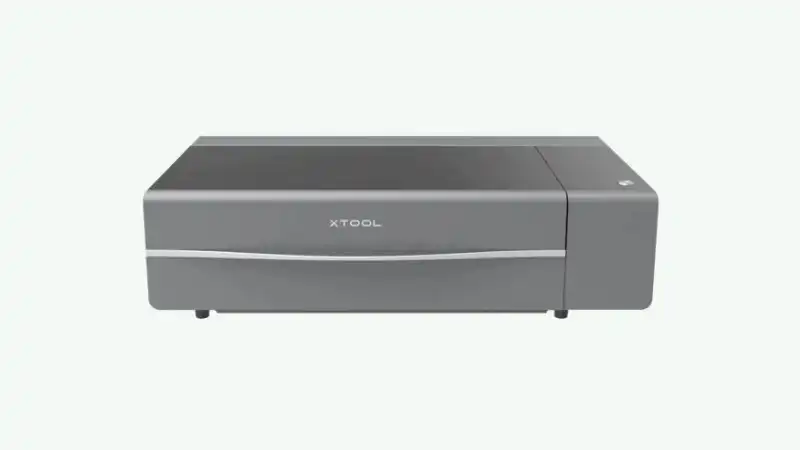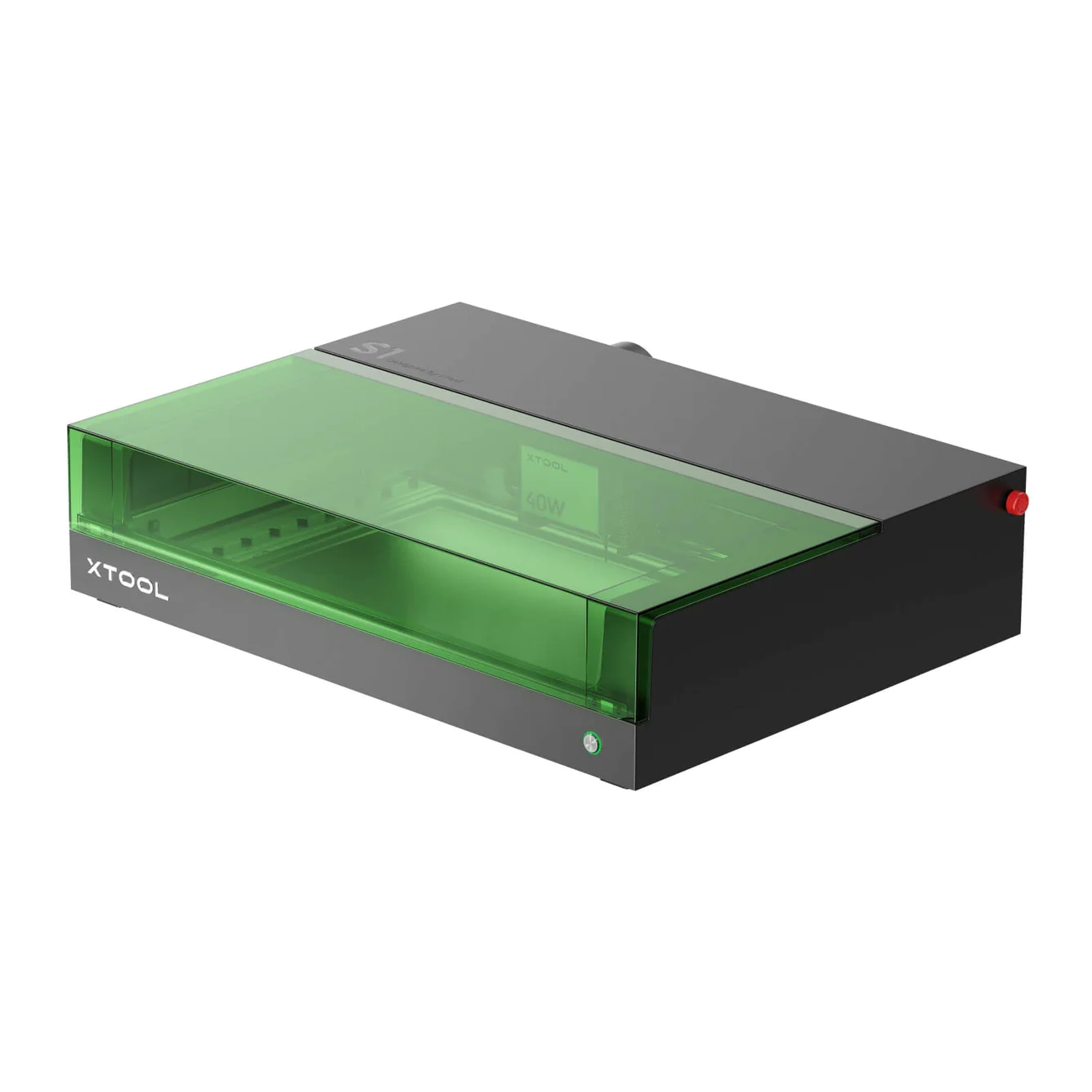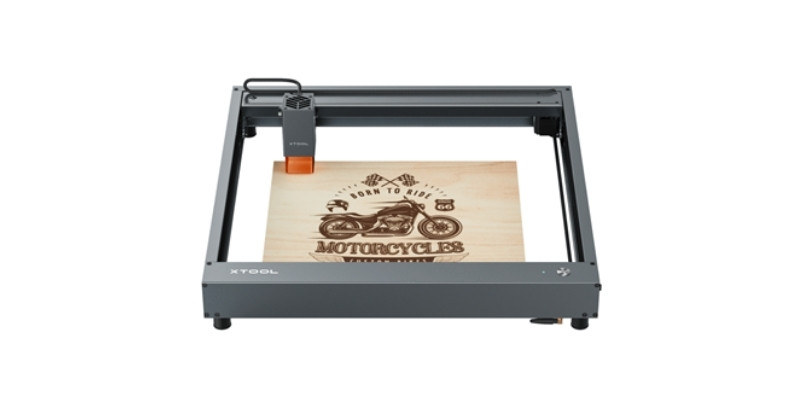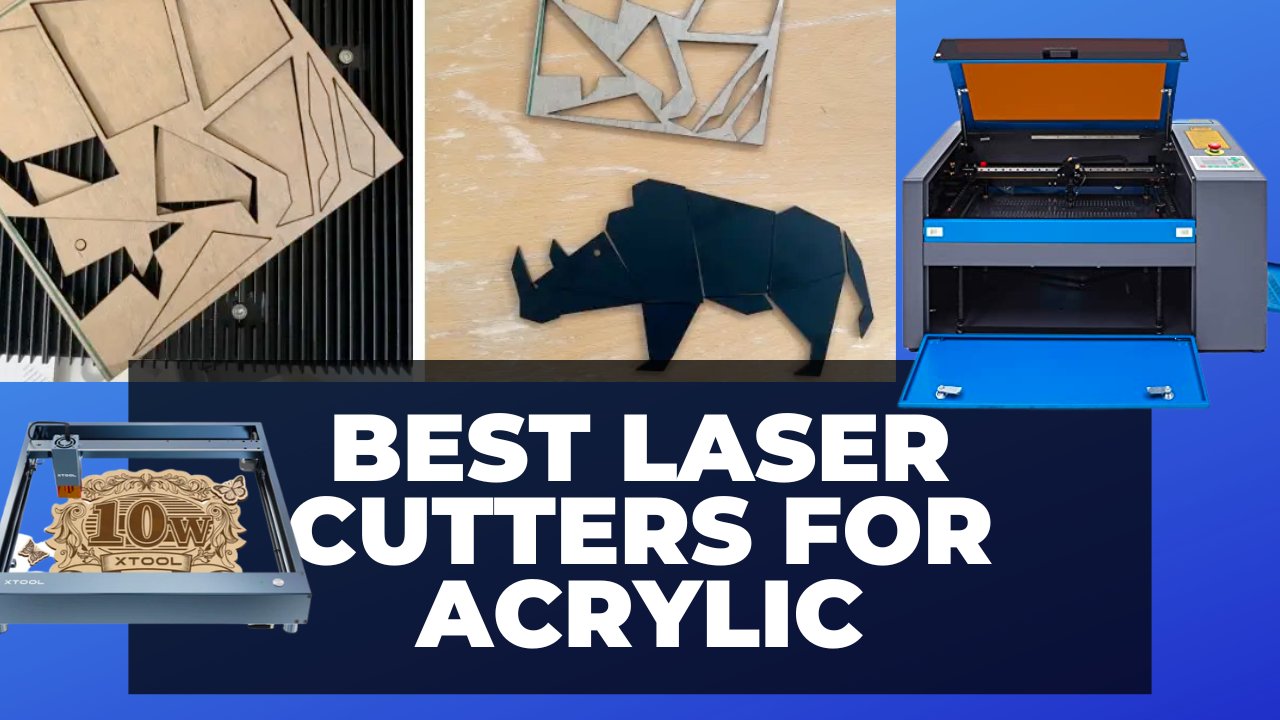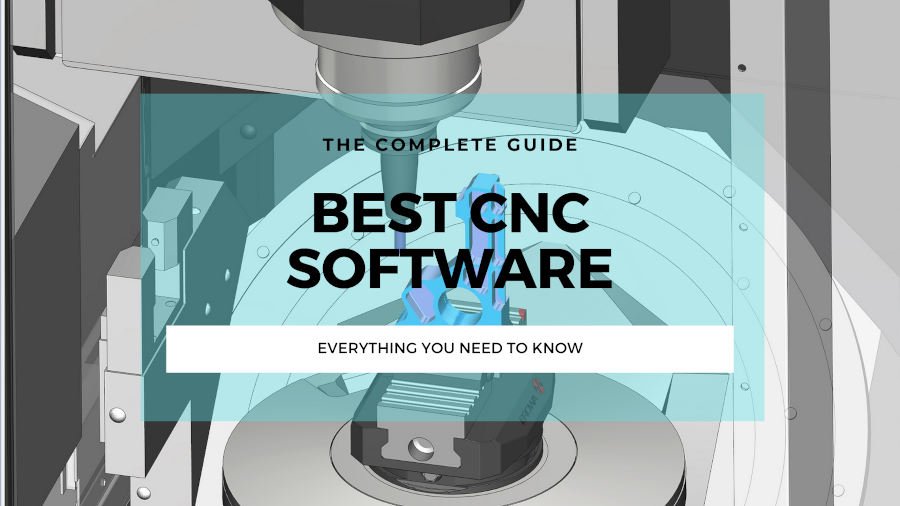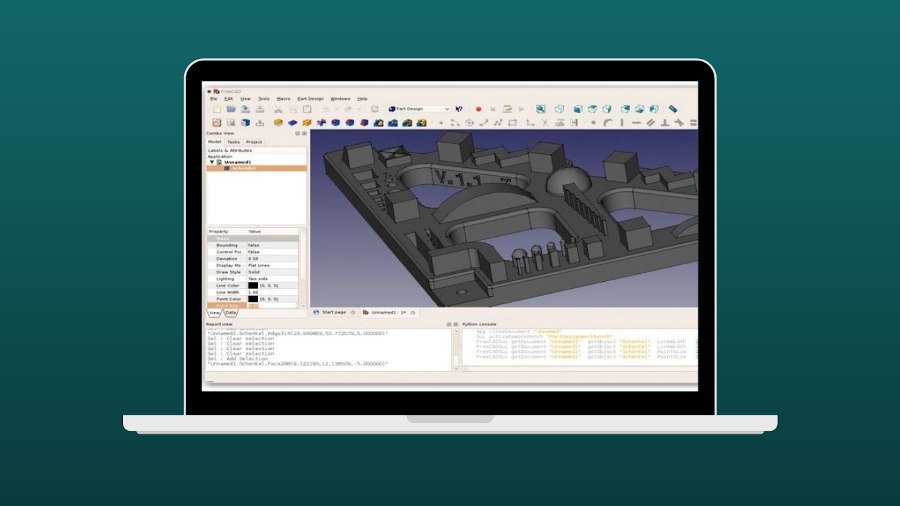The best wood laser engravers blend your artistic endeavors with powerful design software while saving you time, money, and costly errors. Based on extensive hands-on testing, here’s our top recommendations for wood laser cutting:
|
CNCSourced Rating: |
CNCSourced Rating: |
|
4.7
|
4.5
|
|
$4,399
|
$1,799-$2,299
|
|
Laser type:
CO2
|
Laser type:
Diode
|
|
Working Area:
600 x 308 mm
|
Working Area:
608 x 385 mm
|
|
Laser Power:
55W
|
Laser Power:
20W or 40W
|
|
Max Wood Thickness - Cutting:
20mm
|
Max Wood Thickness - Cutting:
16mm
|
I own several laser engravers, and my favorite is the xTool S1 for cutting and engraving wooden crafts.
I previously recommended the xTool D1 Pro, but the newer S1 is enclosed and has better ventilation to keep fumes away, and is much safer and better overall.
For a CO2 laser I recommend the xTool P2 — it’s the best desktop CO2 laser right now. It’s cheaper and more powerful than the Glowforge Pro, and a better made machine than OMTech Polar or Gweike Cloud Pro.
| Laser Cutter/Engraver Model | Working Area (mm) | Power | Thickest Wood They Can Cut | Price |
|---|---|---|---|---|
| xTool D1 Pro | 432 x 406 | 10W (20W and 40W available) | 15mm* | From $699 to $1,200+ |
| xTool P2 | 600 x 308 | 55W | 20mm | $4,299 |
| xTool S1 | 608 x 385 mm | 20W or 40W | 15mm | $1,799-$2,299 |
| OMTech 80W | 500 x 700 | 80W | 25mm*** | $3,499.99 |
- *For pinewood only; for some other wood types, please see the xTool D1 Pro section below
- **D1 Pro 40W laser module only
- ***For the OMTech AF2080-80; more info in the OMTech section.
In this buying guide, I’ll break down which laser cutter to get for your exact needs, discuss the key factors to consider for wood engraving and cutting specifically, and answer some common FAQs.
The Best Wood Laser Cutters & Engravers
1. xTool S1 – Best Diode Pick
- Price: $1,799 to $2,299 – Available at xTool here
- Work area: 608 x 385 mm
- Laser power: 20W or 40W (2W IR laser attachment also available)
- Max wood thickness: 16mm with the 40W laser head
- Laser type: Diode
- Rotary: Yes
- Max speed: 600 mm/s
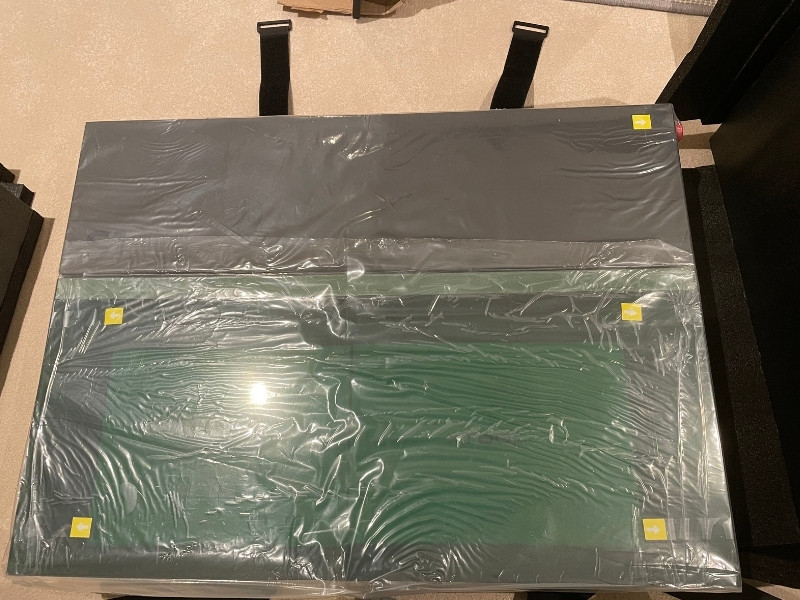
Pros
Cuts 15mm+ thick hardwoods with the 40W laser (around 10mm with the 20W laser)
Fast 600mm/sec speed gets through wooden projects quickly
Generous work area fits larger wood pieces
Enclosed design contains wood burning fumes and debris
Easy to swap laser modules for metal engraving needs if you buy the 2W IR laser
Cons
Using riser base requires propping up thin wood materials as the sensor otherwise won’t reach the material
It’s still not as fast as an equivalent CO2 laser for cutting thicker woods
Air assist will need adjusting for optimum wood cutting
The xTool S1 is a really good choice if you’re a woodworker that needs to cut thicker wood materials, but don’t want to buy a CO2 laser. With the 40W diode laser head, you can cut through even 15mm basswood in a single pass, and if you just opt for the 20W version, you can still cut 10mm basswood sheets.
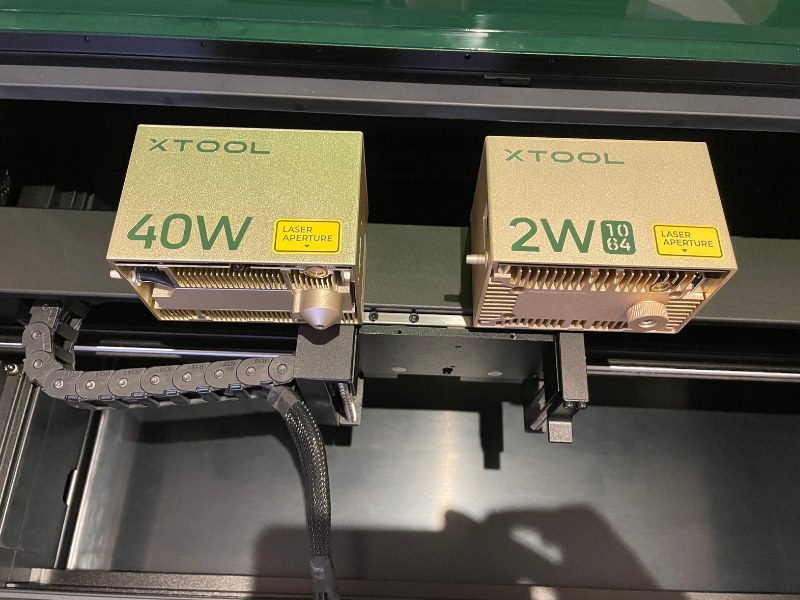
The large work area meant I could easily cut large projects like cutting boards and signs, as well as batch producing smaller trinkets and keychains. If you want to cut really large wood sheets, you can buy the automatic conveyor feeder that goes with the riser base, and then feed in up to 118-inch long wooden sheets.
The main reason to get the S1 over an equal powered D1 Pro is the enclosure and better safety. The enclosed S1 keeps any fires from wood inside, and also has better ventilation to keep all the fumes emitted when burning wood away from you. This is a major drawback of open air diode lasers, but xTool has solved this with the S1, which I am a big fan of.
Just be aware of the potential distance sensor issue when using the riser base with thin wood stock.
2. xTool P2 — Best Desktop CO2 Laser For Wood
- Price: Check at xTool here
- Working area: 600 x 308 mm
- Laser type: CO2
- Power: 55W
- Max wood thickness: 20mm
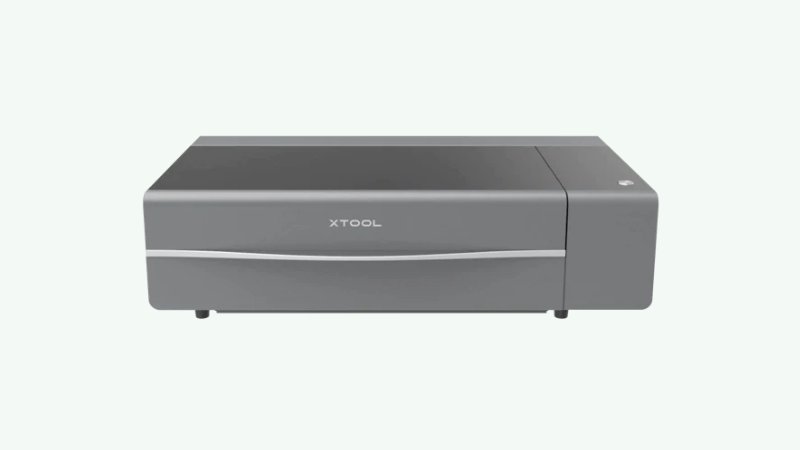
Pros
Powerful 55W CO2 laser in a user-friendly package.
Curved engraving features for wooden spoons, rolling pins, etc.
Cheaper than Glowforge Pro, even with all the accessories added on.
Cons
Materials are expensive on the xTool, and can be bought cheaper elsewhere.
In my opinion, the xTool P2 is the best CO2 laser for woodworkers, crafters, and hobbyists right now. For the price, no other desktop CO2 laser offers 55W power – and no other laser in the price range can cut through 20mm thick basswood in a single pass.
The 24” x 12” work area provides ample space for cutting letterboards, signs, jewelry boxes, coasters, and even using the rotary to customize mugs, rolling pins, and other wood best-sellers for your side-hustle.
The dual 16MP cameras eliminate setup guesswork by scanning your material and aligning designs automatically.
Most impressively, the xTool P2 uses these cameras to create depth measurements across uneven, or curved surfaces, so you can engrave perfectly on wooden objects like spoons and bowls. Here’s a wooden spoon I engraved with the P2:
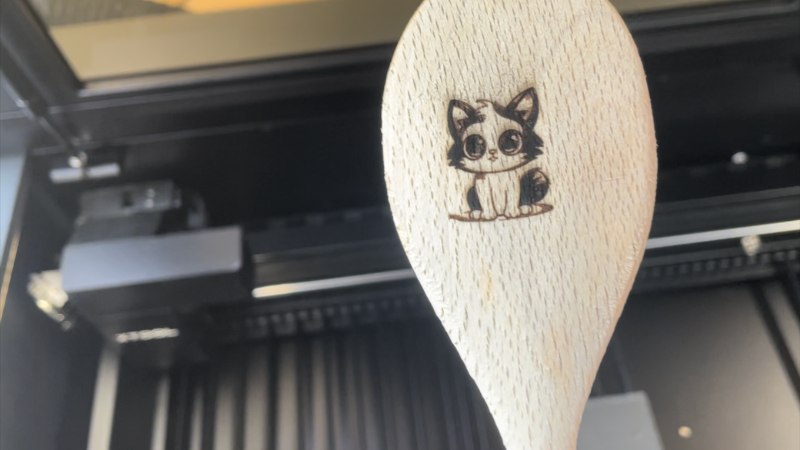
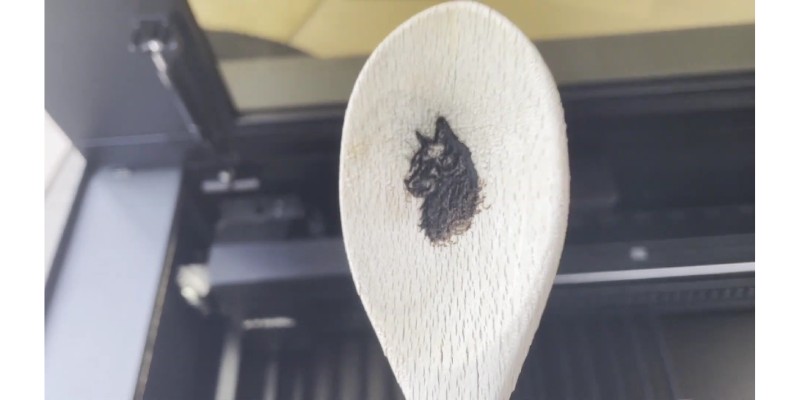
For more info on how this works for laser engraving curved wood materials, I’ve recorded a video on the process here:
Unlike lower-powered diode lasers, the xTool P2’s CO2 laser can cut and engrave all types of wood – from balsa to oak – with precision and speed. It can mark wood darkly when needed, or just etch the surface lightly.
Though the spot size is larger than my xTool D1 Pro, the P2 is still very precise – and has up to 1000 DPI quality (only the Glowforge Pro that I know of has higher quality, and it’s $2000 more expensive).
For example, here’s an intricate slate engraving I tried. It’s not wood, but it shows the accuracy you can create with the xTool P2.
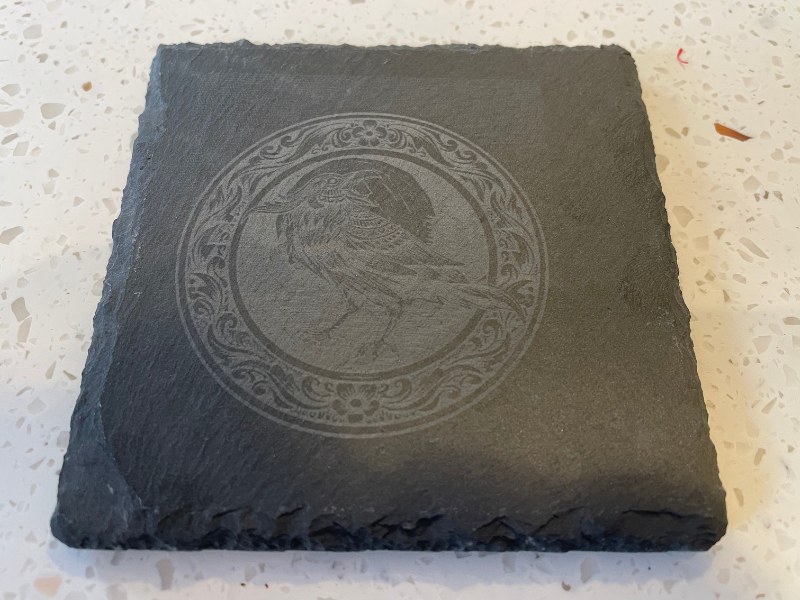
If you have any repeatable wooden projects, like coasters with brands, logos, or repeatable images on, then the batch processing features will save you hours of time.
Simply align your design on one of the material workpieces in the tray, click the “Smart Fill” button, and xTool’s intelligent system will auto-align the image on all other workpieces it detects with the cameras. This repeatability also means you’ll have that same perfect alignment on all your projects without errors.
For professional results in woodworking projects of all kinds, the xTool P2 outperforms competitors with more laser power, faster speeds, and smarter software (XCS has grown on me a lot, and I use it more than Lightburn now). It’s the best wood laser cutter in its price range, perfect for crafters, DIYers, and small businesses alike.
3. xTool D1 Pro 10W – Best Under $1000
- Price: $699 — Available at xTool here
- Enclosure: Available on Amazon
- Rotary Attachment? Yes Available on Amazon here
- Work area: 432 x 406 mm
- Laser power: 10W (5W, 20W, and 40W also available)
- Max Thickness of Wood it can cut: 15mm (with the 40W laser head)

Pros
Well-built: best build quality of any diode laser
Up to 40W laser power options: choose between 5W, 10W, 20W, and a brand-new 40W version
Large working area with extension kit to go even larger (936 x 432 mm)
High-quality laser beam
Performed amazingly and diced through even thicker wood in my hands-on xTool D1 Pro test
Cons
Pricier than Neje, Ortur, and other entry-level lasers (but it’s better than them)
Max Wood Thickness (mm)
| xTool Laser | Basswood | Pinewood | Cherry | Walnut | Cedar | Birch | Plywood | Laser Plywood |
|---|---|---|---|---|---|---|---|---|
| 40W | 15 | 20 | 18 | 15 | 10 | 6 | 3 | 6 |
| 20W | 10 | 15 | 10 | NA | NA | 6 | NA | NA |
| 10W | 6 | NA | 3 | 6 | NA | NA | 3* | NA |
| 5W | 3** | NA | 3** | 3** | NA | NA | NA | NA |
Sources: [1], [6], [7], [8], [9], [10], [11], [12]
- *For cherry plywood
- **For basswood, cherry, walnut plywood
The xTool D1 10W is the best diode laser under $1,000, so if you’re able to spend that kind of money I the xTool. I own both this and the Ortur Laser Master 3, and while I like the Ortur, I think the xTool is better.
xTool D1 10W and Ortur LM3 are very similar in performance, with 10W dual laser power, and both allow for WiFi connectivity and control via an iOS or Android app.


But, to separate the two, the xTool is more sturdily built with steel rods and wheels and protected belts, whereas the Ortur LM3 doesn’t protect the belts. The xTool is also slightly larger, and can be extended to 936 x 432 mm with the extension kit.
The xTool also comes in 5W and 20W versions:
| Model | Where to buy it |
|---|---|
| xTool D1 5W | Available at xTool store here |
| xTool D1 20W | Available at xTool store here |
| xTool D1 40W | Available at xTool store here |
I personally went for the 20W version, and for laser cutting wood, it absolutely dices through it. For example, here’s a 0.5-inch piece of wood we cut right through in no time at all:

You can cut 3 mm basswood or acrylic sheets in a single pass, and laser engrave on wood effectively at about 100 mm/s – making it one of the best laser engravers for cutting boards. It’s also perfect for accurate and contrasting portraits, adding a brand or logo, or, if you buy the RA2 rotary add-on, rounded items too.
Overall, if you have the money to spend, either the xTool, or the Ortur LM3, are the best diode lasers under $1000. More a more in-depth test, you can also read my full xTool D1 Pro laser review.
And if you need even more power, go for the 20W version (we did!)
4. OMTech 80W – Most Powerful CO2 Laser For Thick Wood Cutting
- Price: Check latest price at Amazon here
- Fume Extractor: Available on Amazon
- Rotary Attachment? Yes Available on Amazon here
- Cutting area: 500 x 700 mm
- Power: 80W
- Max Thickness of Wood it can cut: 2/5″
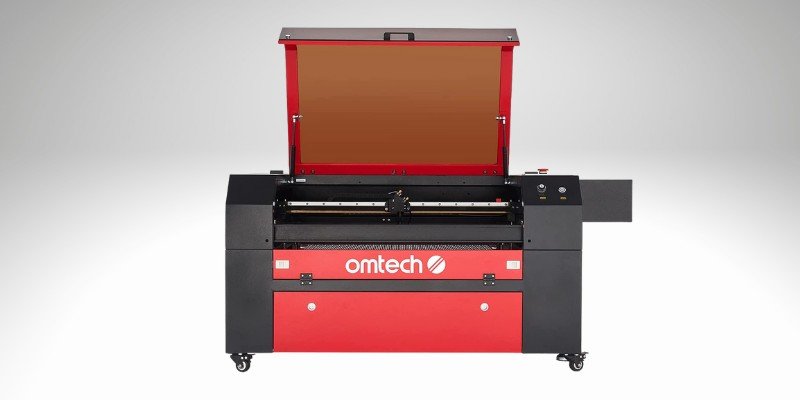
Pros
High-power CO2 laser
Large work area: ideal for cutting larger wood blocks for crafting
Good value: good price for what you get
Tremendous Z-clearance: you can easily place and engrave and cut place boxes and other tall objects
Optional auto lift and rotary
Cons
Too large for home projects
Max Wood Thickness (mm)
| Model | Plywood | MDF | Baltic birch |
|---|---|---|---|
| MF2436-80 | 5 | 5 | N/A |
| AF2080-80 | N/A | N/A | 25 |
Are you looking for the best laser cutter for plywood? If so, look no further than OMTech’s 80W laser. It’s also the best laser cutter for MDF, cherry, balsa, and any other of the best wood for laser cutting and other purposes.
I’ve already discussed lower-cost wood cutting machines for crafts, but the OMTech 80W is a powerful commercial machine. It’s one of the best laser cutters for small businesses and small shops, and works far faster than 40W and 50W OMTech variants if you have the budget.
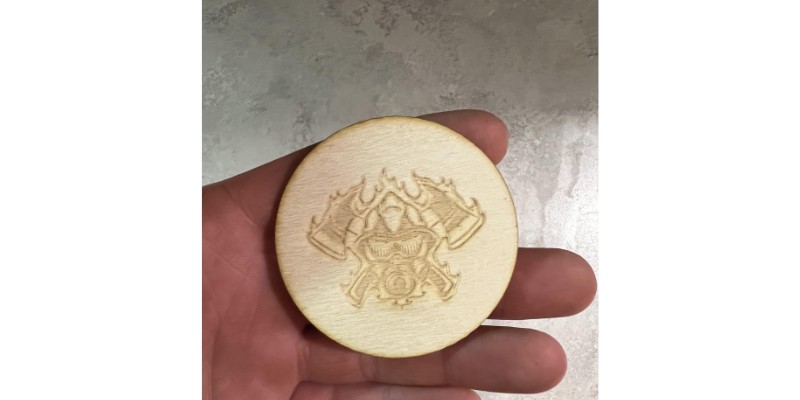
The two-way pass-through system turns into a four-way, giving you even more accommodation for large projects, and it comes with a Ruida control board that’s compatible with the famous Lightburn software, a secondary LCD screen, and increased speed, performance, and cutting power of up to 9mm thick of wood and acrylic materials.
You’ll also get red dot guidance, an adjustable laser nozzle, and a linear rail guiding system that gives you stepper motors for the x and y-axis for efficient power transmission, and higher precision.
Everything in this machine is bred for precision and power, giving you seamless cuts and high-grade designs. However, hardwoods are still a cutting barrier, although you can engrave them.
The focus of this machine's design is on size and power, so if you want to work on large-scale acrylic projects, it will easily fulfill demand.
How To Pick a Laser Engraver For Wood Crafts
Diode or CO2?
Both diode lasers and CO2 lasers can cut wood such as balsa, basswood plywood, and MDF. The laser’s power, and the type of wood you’re cutting or engraving, determines the maximum thickness you can cut.
Diode lasers can work for thin woods like 1/8″ baltic birch, but you’ll need a more powerful CO2 laser to cut thicker wood sheets. CO2 lasers in the 50W range and above cut wood far faster than diode lasers. However, these lasers cost a lot more.
One last tip: don’t buy an IR laser for wood. They’re weaker and have the frequency to engrave metal, but not wood.
Price
Most diode lasers capable of cutting thin 3mm wood sheets cost under $1000. Diode lasers are cheap, and are excellent at cutting wood, so they’re ideal if you’re starting a new business.
The cheapest laser I recommend is the xTool D1 Pro range, and I myself opted for the xTool D1 Pro 20W version for my wood cutting. It’s better than my Ortur Laser Master 3 for wood. But, my xTool S1 is better overall if you have another $500 – it’ll keep you safer by keeping the toxic fumes away from you when laser cutting.
For a CO2, expect to pay upwards of $2500 for OMTech machines, and $4,000 for a user-friendly xTool, or $10,000+ for a commercial Boss Laser, Epilog, Thunder Laser CO2 machine.
| Laser Engraving Machine | Price (USD) |
|---|---|
| xTool D1 Pro | $699 |
| OMTech 80W | $3,199 |
| xTool S1 | $1,799-$2,299 |
| xTool P2 | $4,399 |
Wood Thickness and Laser Power
Your laser’s power determines the thickness of wood you can cut with a single pass. Woods that are thicker than ½” are generally not suitable for laser cutting. But the wood thickness you can cut also depends on the type of wood, and laser power.
Diode lasers have lower power in general, however, they are effective wood cutters at their power. The xTool D1 20W and S1 20W can both cut thicker wood in one pass than other 10W and 5W diode lasers.
On the other hand, to cut a similar thickness of wood with CO2 lasers, choose at least 40W of power. These lasers will also cut wood faster than diode lasers.
Work Area and Extendability
You’ll need a larger work area to cut longer wood sheets, for example for making larger signs to sell. There are three ways to increase your max working area:
- Extension kits
- Passthrough doors
- Removable floors (engraving only)
Some diode lasers offer extension kits to increase your work area and help you cut larger wood sheets. CO2 lasers come enclosed and can’t be extended, but some have passthrough doors or riser base attachments to put longer material sheets through.
Enclosure and Fume Extraction
Laser cutting wood produces toxic fumes and gas, so I HIGHLY recommend using an enclosure on diode lasers that don’t come with one – or at least keep them in a well-ventilated area.
Popular lasers by xTool, Ortur and Neje offer their own enclosures as add-ons, which are reasonably priced. The new xTool S1 also comes enclosed and with ventilation options.
An enclosure allows you to use fume extractors to direct the fumes out a window. Air filters also allow you to cut wood without a fume extractor.
Also, if you’re using an extension kit to increase the work area, check that there is a matching larger enclosure. Otherwise, you’ll need effective ventilation.
Ease of Use
Features like a camera and autofocus are nice quality-of-life enhancers. Emergency stops, pause buttons, red dot pointers, WiFi connectivity, and other features are also nice to have.
| Laser Cutter | Wifi Connectivity | Emergency Stop/Pause Button | Assembly Time |
|---|---|---|---|
| xTool D1 Pro | Yes | Pause Button | 30 minutes |
| Omtech 80W | Yes | Emergency Stop Button | Around an hour |
| xTool S1 | Yes | Yes | A few minutes |
| xTool P2 | Yes | Yes | Less than an hour |
Rotary
You don’t need a rotary if you’re only cutting wood sheets. However, if you’re making decorative cylindrical wooden paraphernalia, you’ll need a laser with a rotary add-on option.
All the lasers I recommend on this buyer’s guide support rotary attachments, and very few lasers no longer support rotaries, with rare exceptions such as the Glowforges.
Which woods you want to cut
You can cut woods like pine, alder, basswood, poplar, balsa, beech, cherry, birch, oak, walnut, mahogany, plywood, bamboo, MDF, and HDF. Cherry is a popular choice in furniture-making. For a more in-depth guide on these woods, I recommend reading our guide to which woods to laser cut with.
Few woods aren’t suitable for laser cutting, but these include extremely dense hardwoods and fiberboard.
However, consider factors like the density and resin content of the wood before getting started. For example, Balsa wood is soft and therefore requires less power to cut than hardwoods like Mahogany. There’s also MDF (made from glued wood fibers), which requires a machine that uses compressed air with its laser for optimized cutting and engraving.
Compatibility and software connectivity
Ensure the machine you choose is compatible with your software and computer of choice for seamless workplace integration.
For example, popular OMTech K40 40W lasers are not compatible with Lightburn, unless upgraded, which is a favorite laser software among many home makers. Keep an eye out to ensure you don’t run into compatibility issues.
| Laser Cutter | Software Compatibility |
|---|---|
| xTool D1 Pro | xTool Creative Space, Lightburn |
| OMTech 80W | Lightburn |
| xTool S1 | xTool Creative Space, Lightburn |
| xTool P2 | xTool Creative Space, Lightburn |
What’s Changed?
We’re constantly updating our recommendations based on our latest hands-on reviews.
Feb 2024 Updates:
- Removed the Glowforge, Flux Beamo, FSL Muse Core, and OMTech 50W. We now recommend fewer lasers and these are less relevant now in 2024 with the latest advancements.
March 2024 Updates:
- Removed the NEJE, and xTool F1.
- Added the xTool S1 as our main diode laser recommendation now over the xTool D1 Pro, which is just not as fit for purpose in comparison.
Sources:
xTool D1 Pro settings
[1] Best Wood for Laser Cutting and Engraving article here
[6] xTool D1 Pro 40W Laser Engraver Review | What can it do? | + Air Assist & Enclosure – video here
[7] Cutting 1/2 inch wood- XTool D1 pro 20 watt video here
[8] What Laser Cut Speed and Power Settings to use here
[9] Cutting 1/4″ solid hardwood for a small decorative box with the xTool D1 Pro 20w video here
[10] Tool D1 Pro Laser Review and Tests on Materials article here
[11] Introducing the xTool D1 Pro 40W Laser Module article here
[12] xTool D1 Pro 10W 2.0 Laser Cutter and Engraver product page here
xTool P2 settings
[2] Material Settings for xTool Machines reference table here
Neje Master 3 settings
[3] NEJE MASTER 3 Laser Engraver product page here
xTool F1 settings
[4] xTool F1 Review and Demo – Portable, Powerful, Fast article here
[13] xTool F1 Laser Demo – Watch It Engrave and Cut! video here
OMTech 80W settings
[5] OMTech USB570z User Manual here
[14] OMTech MF2436-80 User Manual here
Other articles you may be interested in:
- The best Glowforge alternatives
- The best laser engravers for metal
- Best laser engravers for glass
- Best laser cutters for leather
- Best CO2 laser cutters
- Best acrylic laser cutters and engravers
- The best woodworking design software

